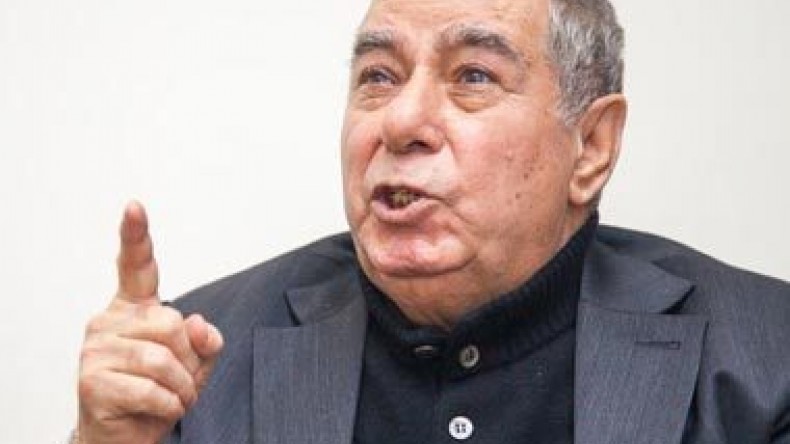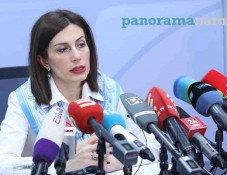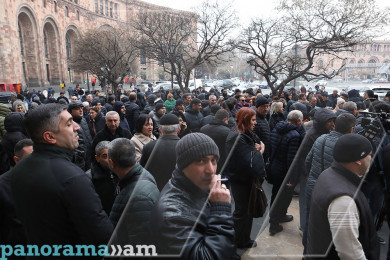
Murderer Ramil Safarov's glorification campaign pushed Ekren Eylisli to publish novel about massacres of Armenians in Azerbaijan
“When I first read that Eylisli was stripped of his rank of national writer and presidential pension, the long queue of those wishing to throw heavier rocks at 75-year-old writer appeared before my eyes at once,” Vitali Sharia writes in his article “Anti-Safarov, or issue of repentance," which was published in Echo of the Caucasus.
Touching upon the persecution of Azerbaijani writer Ekrem Eylisli carried out for his novel-requiem "Stone Dreams" the authors confesses that when he typed in a search engine the name of Eylisli, the situation immediately became obvious. There were both an action organized by the youth who "buried writer Ekram Eylisli’s books," carrying the books of the writer in a coffin, and the picket during which they burnt his portraits in front of his house. And in his native village Eylis the villagers burnt his books and demanded to kill him. And as the apotheosis of moral terror one of the community leaders promises to pay about 10,000 euros to the one who would cut off the ear of the aged writer. There were also numerous accusing publications in Azerbaijani media and indignant speeches in parliament.
“The statement released by the Writers' Union of Azerbaijan says that Ekrem Eylisli’s works caused righteous anger both within literary circles and the Azerbaijani people,” the author says.
In his article Vitali Sharia draws parallels with the persecution of Azerbaijani writer Ekrem Eylisli and events that were held about pardoning Ramil Safarov in Azerbaijan, who hacked to death a sleeping Armenian officer.
“A few months ago I was shocked, like many others, by the story when President of Azerbaijan Ilham Aliyev signed a decree on pardoning Azerbaijani Ramil Safarov who had hacked to death a sleeping Armenian officer in 2004, in Budapest with whom he was passing training in the framework of the NATO’s “Partnership for Peace” program, and then a mass glorification campaign of the criminal was held throughout the country,” Sharia says.
The author notes that all this was beyond belief, and thus he got engaged in search for materials in the internet that would shed light on maximally all the circumstances of that criminal case and the arguments of those who sympathized Safarov.
“But the deeper I went, the more confused I became. It was natural to assume that such a heinous crime of Safarov was pushed by no less monstrous offence from the murdered, such an offence that he could not even wait until morning. (Though, in any case, killing a sleeping man is despicable and cowardly, not a manlike). But no, in fact, the only reasonable explanation, which was made immediately after the murderer was detained, was that the Armenian was smiling in meetings with him. Later some details appeared that seemed to me to be fictitious and designed by the advocate,” the article said.
According to the author, there is a possibility that the exaltation and glorification of Ramil Safarov in Azerbaijan finally pushed Ekrem Eylisli to publish his novel written in 2006-2007.
Russian political scientist Sergei Markedonov at the “Echo of the Caucasus touched upon the issue of persecution of Azerbaijani writer Ekrem Eylisli. He noted that the creativity of Baku in all that regards the "Armenian question" leaves much to be desired: “It would seem that it is a good reason to show that the government is not fighting against the Armenians, but the manifestations of separatism and radicalism. And stimulation of Aylisli could be a kind of positive message, no, not to Yerevan, but all the Armenians living in Nagorno-Karabakh. After all, official Baku calls them citizens of the Azerbaijani Republic. And about the officials recall the experience of living together when the time comes. However, there was no such a signal.”
Touching upon the issue of readiness to come to compromise with the other side, Markedonov noted that the artwork is not an armament race; there is no certain parity there. Books are not a machine or warheads production. “But it is necessary to describe the multi-dimensional reality, for all the wars and conflicts come to an end sooner or later. And such understanding is needed not to answer someone else, but to preserve their professional and civic reputation, which does not necessarily have to join together in a tough confrontation.”
Ekrem Eylisli is national writer (since 1998) and Honored Artist of Azerbaijan, holder of the highest order of Azerbaijan “Istiglal” (2002) and the order of “Shokhrat” for his outstanding merits in the literature of Azerbaijan. Recently, on the website of Russian magazine “Friendship of Nations” was published his novel titled “Stone Dreams” in which the author describes the massacres of Armenians in Baku in 1990 and in Nakhichevan in 1919. The author in his novel speaks positively about the Armenian people and their culture. The novel “Stone Dreams” also contains criticism over the former Azerbaijani President Heydar Aliyev and the tyranny of the system created by him.
After publication of the novel, Eylisli was exposed to severe pressures in Azerbaijan; the pro-governmental youth held rally in front of his house, his issue was discussed in the parliament of Azerbaijan, MPs suggested to burn his books and to deprive him of citizenship and deport from Azerbaijan. Many people “blamed” Eylisli in his Armenian origin, etc. President of Azerbaijan Ilham Aliyev deprived him of personal pension and the title of National Writer, and accused him of “purposefully distorting the history of Azerbaijan” and “in distorting realities about history of Azerbaijan in an inappropriate way.”
The leader of the pro-governmental party ”Modern Musavat” Hafis Hajiyev announced that he would pay about 10 Euros to the one who will cut the ear of the writer. Only after the intervention of the media, the politician was “warned” by the Interior Ministry of Azerbaijan about the illegality of such appeals.
The U.S. Department of State and the OSCE Office in Baku condemned persecution of Eylisli in Azerbaijan and called on the authorities to fulfill their obligations.
Newsfeed
Videos






























